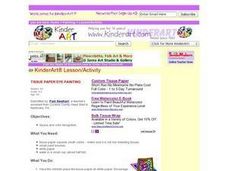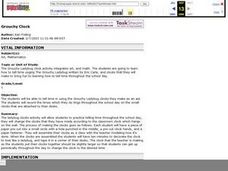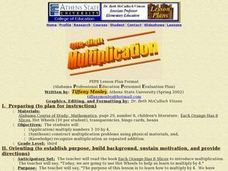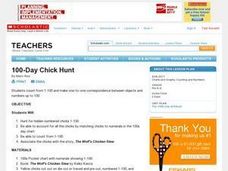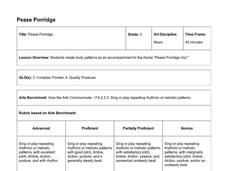Curated OER
Tissue Paper Dye Painting
Use tissue paper squares to create collage art. Young artists discuss colors as they place and glue each piece of tissue on the paper. Tip: Cut out large basic shapes instead. Have the class create images using the tissue...
Pennsylvania Department of Education
Shapes Around Us
Learners use manipulatives to study shapes. They sort shapes and use correct geometric terminology to describe them. Students find real-life examples of 2 and 3 dimensional shapes, and classify figures in their classroom according to...
Curated OER
Around the Town
In the world of GPS, make sure your kids can still read maps and determine distances between locations. You will need neighborhood street maps, ideally of your class' home turf. Ask kids questions about different locations in relation to...
Curated OER
Grouchy Ladybug
First graders are going to learn how to tell time using The Grouchy Ladybug written by Eric Carle, and clocks that they will make to bring fun to learning how to tell time throughout the school day.
Curated OER
Graphing Memories
Mem Fox’s Wilfrid Gordon McDonald Partridge provides the labels for a graphing activity. Class members create an illustration of a memory item brought from home, and place their illustration in the proper column of a graph. When the...
Curated OER
One-Digit Multiplication
Students multiply the numbers one through ten by four, construct multiplication problems using physical materials, and recognize multiplication as repeated addition. They practice by playing multiplication Bingo.
Curated OER
100th Day Chick Hunt
Young mathematicians listen to The Wolf's Chicken Stew by Keiko Kasza and review number names on a pocket chart that shows numbers from 1 to 100. They locate 100 numbered cutout chicks hidden in the classroom and match them to the...
Curated OER
Funerals and Burial Rites
Ninth graders research burial practices that originated in West Africa and then migrated to the South Carolina and Ohio. They compare and contrast burial practices in both places. As students collect information and data, they organize...
Curated OER
Shapes
Fifth graders explore shapes. They recognize and name two-dimensional and three-dimensional shapes. Pupils discuss the properties and criteria for each shape they find in real life and construct a Kid Pix project using pictures of the...
Curated OER
The King's Chessboard
Middle schoolers speculate on the better rate of pay: a dollar a day for 10 days, or a penny the first day, two pennies the second, doubling each day for 10 days. Start by listening to the story The King's Chessboard, by David Birch....
Hawaiʻi State Department of Education
Pease Porridge
Practice using different ways to express a single pattern. The class uses concrete, pictorial, and numerical modes to represent patterns found in a simple rhyme. They will move their bodies, use body percussion, draw, and use numbers to...
Baylor College
Rainbow in the Room
Uncover the science behind the beautiful phenomena of rainbows with a simple demonstration. Shine light through different-sized containers of water as young scientists learn that rainbows occur when visible light is split up into its...
Baylor College
Fossil Fuels and the Carbon Cycle
Humans are quickly depleting Earth's fossil fuels and locating them is becoming increasingly difficult! Layered muffins are used for models as young geologists take core samples in order to determine the presence of oil. Consider first...
Baylor College
Fuel for Living Things
During a three-part lesson plan, learners make a cabbage juice pH indicator and use it to analyze the waste products of yeast after feeding them with sugar. The intent is to demonstrate how living organisms produce carbon dioxide, which...
Baylor College
Finding the Carbon in Sugar
In session one, demonstrate for your class how a flame eventually goes out when enclosed in a jar in order to teach that oxygen is required for combustion. In session two, class members then burn sugar in a spoon to observe how it...
Baylor College
What Is the Water Cycle?
Small groups place sand and ice in a covered box, place the box in the sunlight, then observe as evaporation, condensation, and precipitation occur. These models serve as miniature water cycles and demonstrations of the three phases of...
Baylor College
What Makes Water Special?
Get close up and personal with a drop of water to discover how the polarity of its molecules affect its behavior. Elementary hydrologists split and combine water droplets, and also compare them to drops of oil. Much neater than placing a...
Baylor College
There's Something in the Air
Clever! In order to compare indoor and outdoor dispersal rates for the movement of gases and particles through air, collaborators will participate in a classroom experiment. Set up a circular grid and set students on lines that are...
Baylor College
Heart and Lungs
With a partner, youngsters measure their pulse and breathing rates, both at rest and after running in place for a minute. While this activity is not novel, the lesson plan includes a large-scale classroom graphing activity and other...
Baylor College
Dust Catchers
In class, your emerging environmentalists construct dust catchers. They take them home for a week or two, and then bring them back into class to examine under a magnifier. From this activity, they learn what makes up dust and that...
Baylor College
Moving Air
In lab groups, young scientists place aluminum cans with a bubble-solution cap into different temperatures of water to see what size of bubble dome forms. As part of an atmosphere unit in preparation for learning about convection...
Baylor College
Using Heat from the Sun
Let's heat things up! This simple experiment demonstrates for young scholars the important role the sun plays in providing the earth with energy. Place one cup of water in direct sunlight and one in shade, then take measurements in order...
Curated OER
Number Sense Sampler
First graders illustrate a math problem with counters while reading story books, such as Margie Burton's "Add the Animals". They demonstrate a positive learning attitude toward mathematics and communicate clearly in oral, artistic,...
Curated OER
Surprise Snack
Students prepare a simple recipe and engage in a surprise math lesson. They enjoy making a class book featuring their favorite recipes, and can host a party with members of the school staff once their snacks are prepared.
